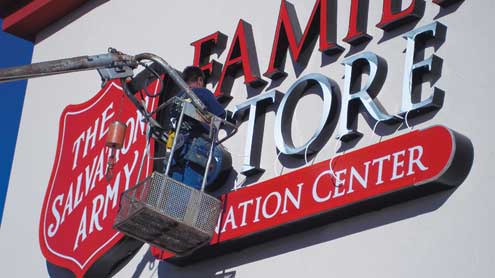Listen to this article
Listen to this article
Loading
Play
Pause
Options
0:00
-:--
1x
Playback Speed- 0.5
- 0.6
- 0.7
- 0.8
- 0.9
- 1
- 1.1
- 1.2
- 1.3
- 1.5
- 2
Audio Language
- English
- French
- German
- Italian
- Spanish
Open text
social programs reveal strong commitment. salt lake city arp develops model program. rise and shine!- beneficiary pamela hawk prepares a nutritiuos breakfast for the men and women in salt lake city’s program. by captain jack allemang and jerry miller –. the adult treatment program in salt lake city is a living example of the salvation army’s ability to adapt its programs to the people it serves. the salt lake corps has dealt with some alcoholics since its beginning in 1887. unlike the traditional adult rehabilitation program, the thrift store operation is run separately. located in downtown salt lake city, the treatment center currently reflects the technologies and needs of the times. in 1996, three major additions changed the face of the program. responding to a long unmet community need, social services director jerry miller expanded the center to include women. it is now licensed by the utah department of social services as a coeducational 24-hour residential treatment program for 82 male and 26 female substance abusers. the center has adapted the american society of addiction medicine placement criteria for the treatment of substance-related disorders (asam). the asam criteria was chosen because it is widely circulated in the alcohol and other drugs (aod) treatment field; they encourage a broad continuum of care; they use a common language for levels of care; they provide potential cost savings; they require a broad multi-dimensional assessment; and they provide a framework for admission, continued stay, and discharge. to assist in the treatment program, the center has purchased a clinical management software package developed by the earley corporation. “txplan” allows counselors to track beneficiaries from intake through admissions, write treatment plans, enter progress notes, develop discharge summaries, and produce other customized reports, and is easily adaptable to accreditation standards. in a collaborative effort with a local mental health organization, the army provides ongoing clinical training, psychiatric backup, a licensed clinician, case managers, and a psychiatric nurse to assist the army in providing treatment to the dual-diagnosed client. in exchange we provide a specified number of beds for the treatment of substance abuse-related disorders. the treatment program includes a range of cognitive behavioral and other therapies that are administered to the beneficiaries on an individual basis; health screening and education; planned clinical program activities designed to enhance the beneficiaries’ understanding of addiction; and individualized assessments and treatment. family and significant other services are also provided.
Open context player
Close context player
Plays:-Audio plays count
social programs reveal strong commitment. salt lake city arp develops model program. rise and shine!- beneficiary pamela hawk prepares a nutritiuos breakfast for the men and women in salt lake city’s program. by captain jack allemang and jerry miller –. the adult treatment program in salt lake city is a living example of the salvation army’s ability to adapt its programs to the people it serves. the salt lake corps has dealt with some alcoholics since its beginning in 1887. unlike the traditional adult rehabilitation program, the thrift store operation is run separately. located in downtown salt lake city, the treatment center currently reflects the technologies and needs of the times. in 1996, three major additions changed the face of the program. responding to a long unmet community need, social services director jerry miller expanded the center to include women. it is now licensed by the utah department of social services as a coeducational 24-hour residential treatment program for 82 male and 26 female substance abusers. the center has adapted the american society of addiction medicine placement criteria for the treatment of substance-related disorders (asam). the asam criteria was chosen because it is widely circulated in the alcohol and other drugs (aod) treatment field; they encourage a broad continuum of care; they use a common language for levels of care; they provide potential cost savings; they require a broad multi-dimensional assessment; and they provide a framework for admission, continued stay, and discharge. to assist in the treatment program, the center has purchased a clinical management software package developed by the earley corporation. “txplan” allows counselors to track beneficiaries from intake through admissions, write treatment plans, enter progress notes, develop discharge summaries, and produce other customized reports, and is easily adaptable to accreditation standards. in a collaborative effort with a local mental health organization, the army provides ongoing clinical training, psychiatric backup, a licensed clinician, case managers, and a psychiatric nurse to assist the army in providing treatment to the dual-diagnosed client. in exchange we provide a specified number of beds for the treatment of substance abuse-related disorders. the treatment program includes a range of cognitive behavioral and other therapies that are administered to the beneficiaries on an individual basis; health screening and education; planned clinical program activities designed to enhance the beneficiaries’ understanding of addiction; and individualized assessments and treatment. family and significant other services are also provided.
Listen to this article













